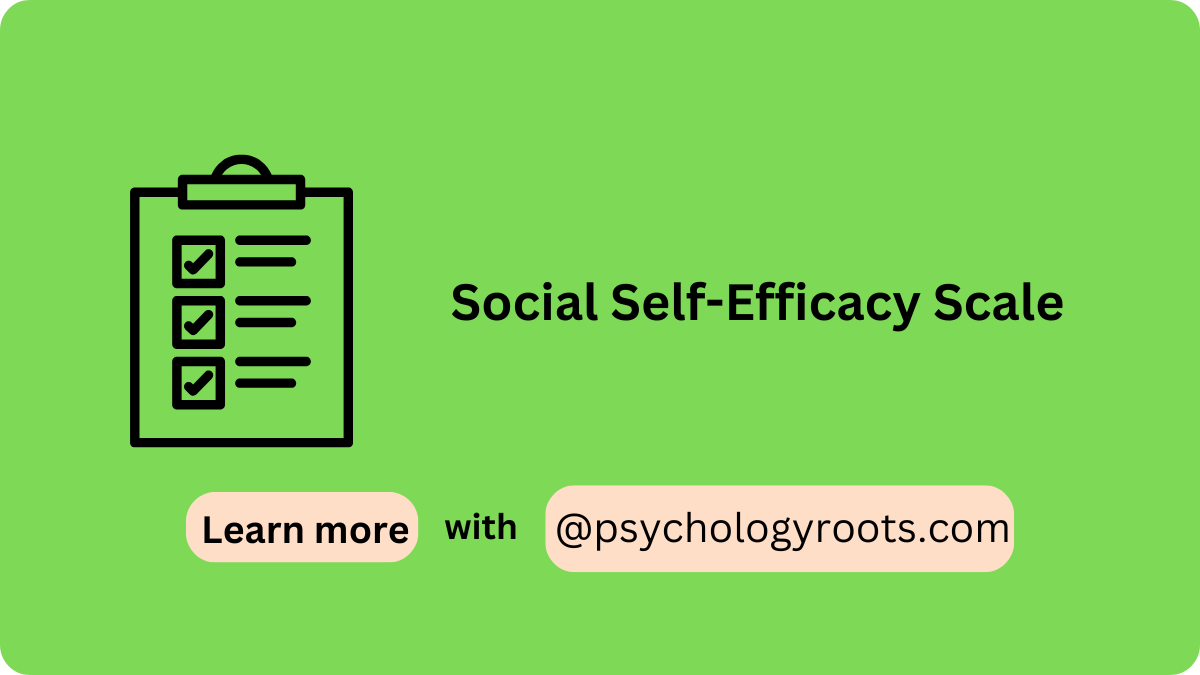Table of Contents
Social Self-Efficacy Scale
Here in this post, we are sharing the “Social Self-Efficacy Scale”. You can read psychometric and Author information. We have thousands of Scales and questionnaires in our collection (See Scales and Questionnaires). You can demand us any scale and questionnaires related to psychology through our community, and we will provide you with a short time. Keep visiting Psychology Roots.
About Social Self-Efficacy Scale
Scale Name
Social Self-Efficacy Scale
Author Details
Peter Muris
Translation Availability
English

Background/Description
The Social Self-Efficacy Scale (SSES), developed by Muris in 2001, is a psychological tool designed to measure an individual’s confidence in their ability to engage in social interactions and build relationships effectively. Social self-efficacy is a critical component of mental health and social functioning, influencing how individuals handle interpersonal challenges and establish social connections.
This scale is widely used in research and clinical settings to assess self-perceived social competence. It is particularly relevant for understanding social anxiety, interpersonal skills deficits, and related psychological issues among adolescents and adults.
This subscale measures youths’ self-assessments of their ability to negotiate social situations and produce successful social interactions. Ages: This scale is recommended for youth ages 14-18 (Grades 8-12).
Administration, Scoring and Interpretation
- Format: Self-report questionnaire.
- Instructions: Participants are asked to rate their confidence in performing various social tasks on a Likert scale.
- Duration: The scale typically takes 10–15 minutes to complete.
- Environment: Ensure a quiet and private setting for administration to encourage honest responses.
Reliability and Validity
Reliability: Alpha is .85.
Available Versions
8-Items
Reference
Muris, P. (2001) A brief questionnaire for measuring self-efficacy in youth (s). Journal of Psychopathology and Behavioral Assessment, (23), 145-149.
Important Link
Scale File:
Frequently Asked Questions
Q1: What is the purpose of the Social Self-Efficacy Scale?
It assesses an individual’s confidence in their ability to navigate social interactions effectively.
Q2: Who can use this scale?
Researchers, clinicians, and educators can use this scale to evaluate social self-efficacy in adolescents and adults.
Q3: What are the practical applications of this scale?
It helps identify individuals who may need support in building social skills or addressing social anxiety.
Q4: Can this scale be used for clinical diagnosis?
While it is a useful assessment tool, it is not designed for diagnostic purposes but rather to complement other assessments.
Q5: Is the scale available in multiple languages?
Currently, it is available in English, but it can be adapted for other languages through proper translation and validation procedures.
Disclaimer
Please note that Psychology Roots does not have the right to grant permission for the use of any psychological scales or assessments listed on its website. To use any scale or assessment, you must obtain permission directly from the author or translator of the tool. Psychology Roots provides information about various tools and their administration procedures, but it is your responsibility to obtain proper permissions before using any scale or assessment. If you need further information about an author’s contact details, please submit a query to the Psychology Roots team.
Help Us Improve This Article
Have you discovered an inaccuracy? We put out great effort to give accurate and scientifically trustworthy information to our readers. Please notify us if you discover any typographical or grammatical errors.
Make a comment. We acknowledge and appreciate your efforts.
Share With Us
If you have any scale or any material related to psychology kindly share it with us at psychologyroots@gmail.com. We help others on behalf of you.